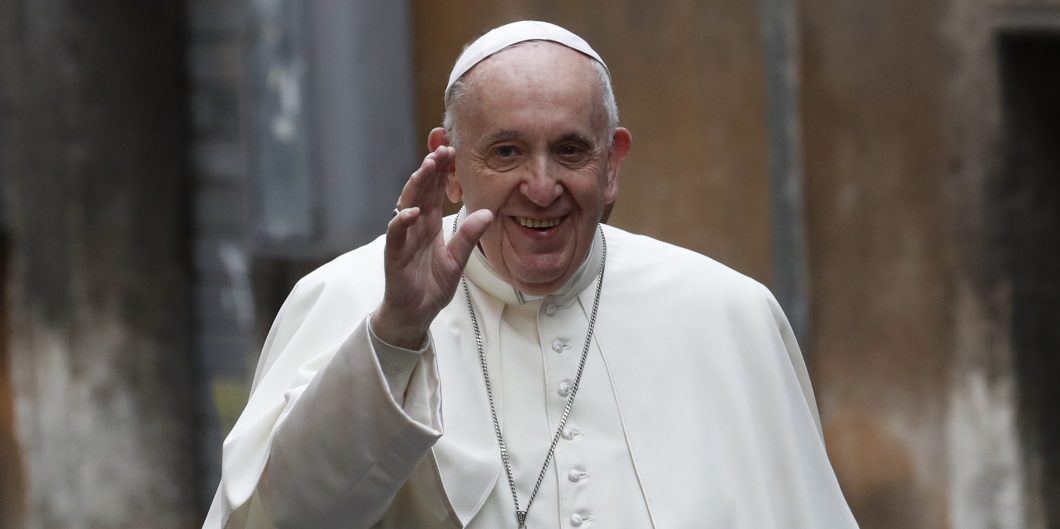What the Church’s hierarchy has lacked is not the canonical mechanisms necessary for dealing with abuse, but a zeal for justice.
A Challenging Continuity
Editor’s Note: This essay is part of Magisterial Discontents: A Symposium on Catholic Social Teaching
Catholic Social Teaching is sound, but the phrase itself has acquired a weaselly tone in American politics. American politicians cast Catholic Social Teaching as a report card, not too different from grades offered by the NRA or the ACLU. The Church puts forward a set of policy priorities, and politicians highlight the “subjects” they excelled in. They try to win over their constituents by talking up their good record on care for the unborn or care for the alien.
But the Catholic Church does not score votes the way an advocacy group does, and the claims of the Catholic Church are not the kind where a few sins and a few good works can average out for a passing grade.
Like “The New Evangelization” and “The Benedict Option,” Catholic Social Teaching is a new phrase for an old truth, meant to get our attention when we’ve begun tuning out Christ’s familiar words. Rerum Novarum, Pope Leo XIII’s 1891 encyclical On the Condition of Labor is often cited as one of the earliest documents on Catholic Social Teaching in response to the modern world. But there has been no disjunction between that document and those that followed (including Quadragesimo Anno, Evangelium Vitae, etc) and the early patristics.
Popes issue encyclicals, while early Church Fathers like St. John Chrystostom left behind homilies on wealth and poverty. Our duty does not vary, even as the specific challenges we confront may change. Catholic social teaching asks us to be who Christ has asked us to be: perfect as our heavenly Father is perfect.
The further elaboration of social teaching, the principles of solidarity, subsidiarity, and a preferential option for the poor, are all intended to support us in living out that fundamental vocation to holiness. They are guardrails to guide us as we form our consciences. They help to check us as we rationalize our way out of our duty.
But the temptation remains to define the teaching down, to reduce a transformational call to a list of smaller policy questions. The reception of Pope Francis’s 2015 encyclical on the environment, Laudato Si’, is an instructive example of this flattening impulse. I take this one document as an example of how we need to approach all the sources that inform our consciences on Catholic Social Teaching.
While I was working as a data journalist, my editor asked if there was any survey data I should be unearthing in preparation for the release of Laudato Si’. He wanted to know if there was a way we could score American churchgoers and assess whether Catholics agreed with the pope’s teaching.
He must have been anticipating an encyclical more like Humanae Vitae; one with a clear yes or no ruling on a specific matter of public life. I didn’t anticipate that Laudato would spark such a specific examination of conscience. When the encyclical came out, we passed on a story of this type, but other, less restrained outlets translated the pope’s remarks into a new set of commandments, mostly to do with air-conditioning (instrumentorum aëri temperando, in the Latin).
But the pope hadn’t told Catholics what temperature to set their thermostats to, on pain of sin. Those clickbait stories were an extrapolation from this paragraph:
People may well have a growing ecological sensitivity but it has not succeeded in changing their harmful habits of consumption which, rather than decreasing, appear to be growing all the more. A simple example is the increasing use and power of air-conditioning. The markets, which immediately benefit from sales, stimulate ever greater demand. An outsider looking at our world would be amazed at such behaviour, which at times appears self-destructive.
What Pope Francis held up as a specific example of a destructive tendency was taken as the primary recommendation. Those publications cast the Holy Father as simultaneously petty and prescriptive. They minimized the sweeping radicalism of his call to holiness. Using your air conditioner a little less is the least of what he was asking for.
In Laudato Si’, Pope Francis responds to the danger of climate change, but not only as a threat to the environment around us. It is the physical manifestation of a spiritual sickness. If an abundant, accessible, zero-emission energy source were discovered tomorrow, it would be a blessing for the Earth, but man wouldn’t be spared the requirement to grow in discipline as a steward. We must rend our hearts, not just our thermostats.
Catholic Social Teaching is ecological, not just in that it pertains to the environment, but in that no part of it can be cleaved off and considered in isolation. It is for this reason that in Laudato Si’, which is, on the surface, primarily about the environment, Pope Francis find it natural to address the sterilizing impulses of Western nations.
Instead of resolving the problems of the poor and thinking of how the world can be different, some can only propose a reduction in the birth rate. At times, developing countries face forms of international pressure which make economic assistance contingent on certain policies of “reproductive health.” […] To blame population growth instead of extreme and selective consumerism on the part of some, is one way of refusing to face the issues. It is an attempt to legitimize the present model of distribution, where a minority believes that it has the right to consume in a way which can never be universalized, since the planet could not even contain the waste products of such consumption.
Pope Francis writes against both the fearful kind of scarcity mindset, which suggests the poor cannot be allowed to have children because they cannot afford them, while also opposing a too-future oriented way of thinking that ignores present degradation in favor of growing our way out of poverty later. As he states earlier in the encyclical, “The human environment and the natural environment deteriorate together; we cannot adequately combat environmental degradation unless we attend to causes related to human and social degradation.” The Catholic claim is an integral anthropology. Creation is part of a whole, the work of one Creator, and we can only get so far if we try to treat elements of our work as stewards in isolation from one another.
Because we cannot pick and choose elements from Catholic Social Teaching, it will never be a comfortable fit for either party or for any person. We will all run into friction when our own vices cut against the common good. Our public policy can (and should) cover the gap when we leave our duty undone, but our injustices leave wounds that require the confessional, as well as the voting booth, to salve.
An employer who cheats his workers can and should be restrained by the law. His employees deserve justice (and back pay, with interest). But when their complaints have been heard, the situation is still not fully resolved. The employer still stands in peril of his soul if he doesn’t repent of his injustice. The law can cover only so many eventualities—if the boss still thinks of his workers as human capital to exploit, not as people, he will find not-yet-prohibited injustices to inflict.
We will never reach a point of enough court appointments, sufficiently smooth bureaucracy, or abundant prosperity to transcend our need to care for each other.
For this reason, Catholic Social Teaching should never become a program administered on behalf of the poor without the cry of the poor being fully heard and represented in decision-making. “Nothing about us without us,” is a modern call to both solidarity and subsidiarity. In the halls of congress, on the boards of non-profits, in the “last-mile” on the ground work to administer aid, the poor and needy should always have a voice and a vote.
Care for the poor is not a job that can be delegated to a technocratic elite—it is a universal calling to love our neighbor. Welfare programs for the poor are also a spiritual safety net for the rich, whose wealth puts them in greater spiritual danger. No one is so destitute to be regarded as solely a recipient of aid; even the poorest, weakest, non-verbal person has something to offer in prayer for others. As the Catechism instructs us, “Each creature possesses its own particular goodness and perfection… Man must therefore respect the particular goodness of every creature, to avoid any disordered use of things.”
When the comfortable decide, alone, how to best protect the vulnerable, they often become, per Pope Francis, “those who doggedly uphold the myth of progress and tell us that ecological problems will solve themselves simply with the application of new technology and without any need for ethical considerations or deep change.” These top-down programs, however well intentioned, can offer material aid while missing the depth of our duty to one another.
The law can and should operate as a teacher, but it is a limited tool. The law is impersonal, and it is, at best, a kind of via negativa—prohibiting certain injustices without being able to offer a full vision of justice and right relation. Encyclicals and other articulations of Catholic Social Teaching help to illuminate the anthropology that underlies these rules. No white paper on marginal tax rates and redistribution can speak as clearly as St. Basil the Great when he instructs us:
When someone steals another’s clothes, we call them a thief. Should we not give the same name to one who could clothe the naked and does not? The bread in your cupboard belongs to the hungry; the coat unused in your closet belongs to the one who needs it; the shoes rotting in your closet belong to the one who has no shoes; the money which you hoard up belongs to the poor.
St. Basil lays out our duty, without specifying the exact temporal incentives or punishments that should help us live up to this responsibility. Politicians can make modest improvements to our laws, but it falls to laypeople to speak clearly and strongly about the full implications of Catholic Social Teaching, both to evangelize our elected representatives and to remind ourselves of our own work.
Catholic Social Teaching will never be popular. It unifies by unsettling us all. It is not a way for the rich to decide how to take care of the poor, but the forum in which all, regardless of their worldly status, stand vulnerable before their Judge.
We will never reach a point of enough court appointments, sufficiently smooth bureaucracy, or abundant prosperity to transcend our need to care for each other. As the catechism states, “No creature is self-sufficient. Creatures exist only in dependence on each other, to complete each other, in the service of each other.” In our personal and political life, we will always have the poor with us—we salve our spiritual poverty when we take responsibility for ameliorating material precarity.



